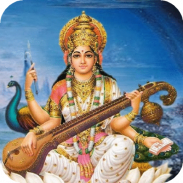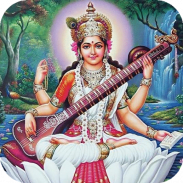




Saraswati Stotram मi सरस्वती स्तोत्रम

Beschreibung von Saraswati Stotram मi सरस्वती स्तोत्रम
Saraswati maa Mantras | OFFLINE | HD Audio | Repeat | FREE | HD God image
Saraswati is the Hindu goddess of knowledge, music, arts, wisdom and learning worshipped throughout Nepal and India.[3] She is a part of the trinity (Tridevi) of Saraswati, Lakshmi and Parvati. All the three forms help the trinity of Brahma, Vishnu and Shiva to create, maintain and regenerate-recycle the Universe respectively.
The earliest known mention of Saraswati as a goddess is in the Rigveda. She has remained significant as a goddess from the Vedic period through modern times of Hindu traditions.[5] Some Hindus celebrate the festival of Vasant Panchami (the fifth day of spring) in her honour,and mark the day by helping young children learn how to write alphabets on that day. The Goddess is also revered by believers of the Jain religion of west and central India,[8] as well as some Buddhist sects.
Saraswati who is revered as a goddess of knowledge, music and arts is also found outside Nepal and India, such as in Japan, Vietnam, Bali (Indonesia) and Myanmar.
Saraswati, sometimes spelled Sarasvati, is a Sanskrit fusion word of Sāra (सार) which means essence, and Sva (स्व) which means one self, the fused word meaning "essence of one self", and Saraswati meaning "one who leads to essence of self knowledge". It is also a Sanskrit composite word of surasa-vati (सुरस-वति) which means "one with plenty of water".
The word Saraswati appears both as a reference to a river and as a significant deity in the Rigveda. In initial passages, the word refers to Sarasvati River and mentioned with other northwestern Indian rivers such as Drishadvati. Saraswati then connotes a river deity. In Book 2, Rigveda calls Saraswati as the best of mothers, of rivers, of goddesses.[16]
अम्बितमे नदीतमे देवितमे सरस्वति |
– Rigveda 2.41.16
Best Mother, best of Rivers, best of Goddesses, Sarasvatī, We are, as ’twere, of no repute and dear Mother, give thou us renown.
Saraswati is celebrated as a feminine deity with healing, purifying powers of abundant, flowing waters in Book 10 of Rigveda, as follows:
अपो अस्मान मातरः शुन्धयन्तु घर्तेन नो घर्तप्वः पुनन्तु |
विश्वं हि रिप्रं परवहन्ति देविरुदिदाभ्यः शुचिरापूत एमि ||
– Rigveda 10.17
May the waters, the mothers, cleanse us,
may they who purify with butter, purify us with butter,
for these goddesses bear away defilement,
I come up out of them pure and cleansed.
–Translated by John Muir
In Vedic literature, Saraswati acquires the same significance for early Indians (states John Muir) as that accredited to the river Ganges by their modern descendants. In hymns of Book 10 of Rigveda, she is already declared to be the "possessor of knowledge". Her importance grows in Vedas composed after Rigveda and in Brahmanas, and the word evolves in its meaning from "waters that purify", to "that which purifies", to "vach (speech) that purifies", to "knowledge that purifies", and ultimately into a spiritual concept of a goddess that embodies knowledge, arts, music, melody, muse, language, rhetoric, eloquence, creative work and anything whose flow purifies the essence and self of a person. In Upanishads and Dharma Sastras, Saraswati is invoked to remind the reader to meditate on virtue, virtuous emoluments, the meaning and the very essence of one's activity, one's action.
Saraswati is known by many names in ancient Hindu literature. Some examples of synonyms for Saraswati include Brahmani (power of Brahma), Brahmi (goddess of sciences), Bharadi (goddess of history), Vani and Vachi (both referring to the flow of music/song, melodious speech, eloquent speaking respectively), Varnesvari (goddess of letters), Kavijihvagravasini (one who dwells on the tongue of poets).
Saraswati maa Mantras | OFFLINE | HD Audio | wiederholen | FREE | HD Gott Bild
Saraswati ist die hinduistische Göttin des Wissens, Musik, Kunst, Weisheit und in Nepal und Indien verehrt Lernen. [3] Sie ist ein Teil der Dreifaltigkeit (Tridevi) von Saraswati, Lakshmi und Parvati. Alle drei Formen helfen, die Trinität von Brahma, Vishnu und Shiva zu erstellen, pflegen und regenerieren-recyceln das Universum sind.
Die älteste bekannte Erwähnung von Saraswati als Göttin ist im Rigveda. Sie blieb bedeutend wie eine Göttin aus der vedischen Zeit durch moderne Zeiten der Hindu-Traditionen. [5] Einige Hindus feiern das Fest der Vasant Panchami (der fünfte Tag des Frühlings) in ihrer Ehre, und markieren Sie den Tag hilft kleinen Kindern lernen, wie Alphabete an diesem Tag zu schreiben. Die Göttin wird auch von Gläubigen der Jain Religion West- und Zentral-Indien, [8] sowie einige buddhistischen Sekte verehrt.
Saraswati, die als Göttin des Wissens, Musik und Kunst verehrt wird auch außerhalb Nepal und Indien, wie in Japan, Vietnam, Bali (Indonesien) und Myanmar gefunden.
Saraswati, manchmal Sarasvati Dinkel, ist ein Sanskrit-Fusion Wort SARA (सार), was bedeutet Wesen und Sva (स्व), die man selbst bedeutet, um das fusionierte Wort mit der Bedeutung „Wesen eines Selbst“ und Saraswati bedeutet „derjenige, der Essenz führt die Selbsterkenntnis“. Es ist auch ein zusammengesetztes Wort Sanskrit Surasa-Vatis (सुरस-वति), die „eines mit vielen Wasser“ bedeutet.
Das Wort Saraswati erscheint sowohl als Hinweis auf einen Fluss und als bedeutende Gottheit im Rigveda. In ersten Passagen bezieht sich das Wort auf Sarasvati Fluss und mit anderen nordwestlichen indischen Flüssen wie Drishadvati erwähnt. Saraswati konnotiert dann einen Fluss Gottheit. In Buch 2, ruft Rigveda Saraswati als die beste von Müttern, von Flüssen, von Göttinnen. [16]
अम्बितमे नदीतमे देवितमे सरस्वति | - Rigveda 2.41.16
Beste Mutter, am besten von Rivers, am besten von Göttinnen, Sarasvatī, Wir sind, wie ‚twere, ohne die Zuverlässigkeit und lieber Mutter, gib du uns Ruhm.
Saraswati ist als weibliche Gottheit mit Heilung, reinigende Wirkung von reichlich gefeiert, Wasser in Buch 10 von Rigveda fließt, wie folgt:
अपो अस्मान मातरः शुन्धयन्तु घर्तेन नो घर्तप्वः पुनन्तु | विश्वं हि रिप्रं परवहन्ति देविरुदिदाभ्यः शुचिरापूत एमि || - Rigveda 10.17
die Mütter, reinige uns, können sie die mit Butter reinigen, reinigen wir mit Butter, für diese Göttinnen Befleckung tragen weg, ich komme aus ihnen rein und reinigte kann das Wasser. Translatierte von John Muir
In der vedischen Literatur, Saraswati die gleiche Bedeutung für die frühe Indianer erwirbt (sagt John Muir), wie das durch ihre modernen Nachfahren zum Fluss Ganges akkreditiert. In Hymnen des Buchs 10 von Rigveda, wird sie bereits erklärt der „Besitzer des Wissens“ zu sein. Ihre Bedeutung wächst in Veden komponierte nach Rigveda und in Brahmanen, und das Wort entwickelt sich in seiner Bedeutung von „Wasser, das zu reinigen“, um „das, was reinigt“, zu „vach (Sprache), die reinigt“, zu „Wissen, das reinigt“, und schließlich in ein geistiges Konzept einer Göttin, das Wissen verkörpert, Kunst, Musik, Melodie, Muse, Sprache, Rhetorik, Beredsamkeit, kreative Arbeit und alles, dessen Fließ reinigt das Wesen und selbst einer Person. In Upanishaden und Dharma Sastras wird Saraswati aufgerufen, um den Leser daran zu erinnern, auf Tugend, tugendhaft Bezüge, die Bedeutung und das Wesen der eigenen Tätigkeit, seine Aktion zu meditieren.
Saraswati ist unter vielen Namen in alter Hindu-Literatur bekannt. Einige Beispiele von Synonymen für Saraswati umfassen Brahmani (Macht der Brahma), Brahmi (Göttin der Wissenschaften), Bharadi (Göttin der Geschichte), Vani und Vachi (beide mit Bezug auf den Fluss der Musik / Lied, melodischen Sprache, beredt zu sprechen respectively), Varnesvari (Göttin der Buchstaben), Kavijihvagravasini (derjenige, der auf der Zunge der Dichter wohnt).



























